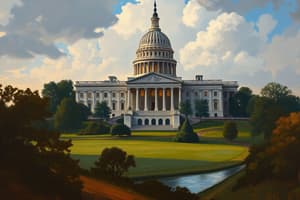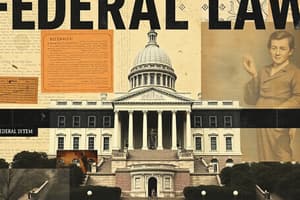Podcast
Questions and Answers
Which of these is the defining characteristic of a federal system of government?
Which of these is the defining characteristic of a federal system of government?
- Power is divided between central and regional bodies. (correct)
- Separate branches have different areas of responsibility.
- Legislative actions are limited by a set of written guidelines.
- Elected representatives make decisions for the nation.
The phrase "You have the right to remain silent" reflects the provision in the Bill of Rights regarding
The phrase "You have the right to remain silent" reflects the provision in the Bill of Rights regarding
- self-incrimination. (correct)
- double jeopardy.
- judicial review.
- eminent domain.
Which of these is the best example of constitutional checks and balances?
Which of these is the best example of constitutional checks and balances?
- Treaties require Senate approval. (correct)
- Courts decide conflicts between states.
- The Constitution may be amended.
- The president is paid for his services.
How did the decision in Marbury v. Madison (1803) strengthen the power of the Supreme Court?
How did the decision in Marbury v. Madison (1803) strengthen the power of the Supreme Court?
What are civil liberties?
What are civil liberties?
Which of the following is an example of the President's ability to check the power of the courts?
Which of the following is an example of the President's ability to check the power of the courts?
Flashcards
Federal Government
Federal Government
A system where governing power is shared between a central authority (national) and regional entities (states, provinces).
Civil Liberties
Civil Liberties
The principle that safeguards individuals' fundamental rights and freedoms. These are considered inherent and essential for a just society.
Judicial Review
Judicial Review
The power of the Supreme Court to review and potentially overturn laws passed by Congress or acts of the President, ensuring they align with the Constitution.
Eminent Domain
Eminent Domain
Signup and view all the flashcards
Double Jeopardy
Double Jeopardy
Signup and view all the flashcards
Right to Remain Silent
Right to Remain Silent
Signup and view all the flashcards
Checks and Balances
Checks and Balances
Signup and view all the flashcards
Presidential Pardon
Presidential Pardon
Signup and view all the flashcards
Marbury v. Madison
Marbury v. Madison
Signup and view all the flashcards
Senate Approval of Treaties
Senate Approval of Treaties
Signup and view all the flashcards
Study Notes
Federal System Characteristics
- Elected representatives make decisions for the nation
- Power is divided between central and regional bodies
- Separate branches have distinct responsibilities
- Legislative actions limited by written guidelines
Bill of Rights Provision
- "You have the right to remain silent" relates to self-incrimination
Constitutional Checks and Balances
- Treaties require Senate approval
- Courts resolve conflicts between states
Marbury v. Madison (1803) Impact
- Established the Supreme Court's power to declare laws unconstitutional
- Strengthened the Supreme Court's authority
Civil Liberties
- Fundamental rights guaranteed to individuals
- Include basic freedoms as birthrights
Presidential Checks on Courts
- Veto power is an example of presidential power to check the courts
Studying That Suits You
Use AI to generate personalized quizzes and flashcards to suit your learning preferences.




